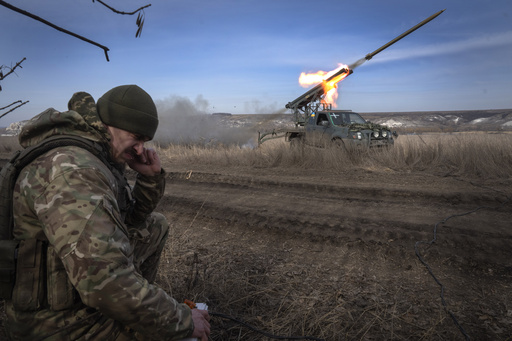KYIV, Ukraine (AP) — Ukraine claimed Tuesday it has sunk another Russian warship in the Black Sea using high-tech sea drones as Kyiv’s forces take aim at targets well behind the war’s front line. Russian authorities did not confirm the claim.
The Ukrainian military intelligence agency said a special operations unit destroyed the large patrol ship Sergey Kotov overnight. The ship, which Ukraine said was commissioned in 2021 and was hit near the Kerch Strait, reportedly can carry cruise missiles and around 60 crew.
The sinking of such a modern ship would be a significant loss and embarrassing blow for Moscow, even though there are dozens of other vessels in its Black Sea fleet.
Kyiv officials say some 20% of Russian missile attacks on Ukraine are launched from the Black Sea, and successful Ukrainian attacks have dented Moscow’s capability.
Patrol ships such as the Sergey Kotov are part of Russia’s countermeasures against drone attacks, according to an article published last month by the Foreign Policy Research Institute, a U.S. think tank. The vessels use radar and a helicopter to detect and destroy drones using grenade launchers and heavy machine guns, it said.
Kyiv’s forces are struggling to keep the better-provisioned Russian army at bay at some points along the largely static 1,500-kilometer (930-mile) front line, but are also taking aim at targets far beyond it.
In the Black Sea, Ukrainian successes against enemy warships have pushed the Russian fleet away from the coast, allowing Ukraine to set up a grain export corridor.
The Ukraine defense ministry posted on X, formerly Twitter, a video of what it said was the nighttime attack on the Sergey Kotov using Magura V5 uncrewed vessels that are designed and built in Ukraine and laden with explosives. Seven Russian crew members were killed and six were injured, while 52 were rescued, the military intelligence agency said.
The Ukrainian claims could not immediately be independently verified. Disinformation has been a feature of the fighting that broke out after Russia’s full-scale invasion of its neighbor in February 2022.
The private security firm Ambrey said the attack took place at the port of Feodosia, in Crimea, which Russia annexed in 2014. Ambrey said it has seen footage taken by a crew member on a merchant vessel in the port, showing the Sergey Kotov firing at the drones.
The ship was hit at least twice, with the second strike resulting in a large blast, Ambrey reported.
Last month, Ukraine claimed it twice sank Russian warships using drones. On Feb. 1, it claimed to have sunk the Russian missile-armed corvette Ivanovets, and on Feb. 14 it said it destroyed the Caesar Kunikov landing ship. Russian officials did not confirm those claims.
Almost two years ago, the flagship of Russia’s Black Sea fleet, the Moskva guided-missile cruiser, sank after it was heavily damaged in a missile attack.
Also Tuesday, the Russian military scrambled a Su-27 fighter jet to escort a French E-3F military surveillance plane, accompanied by two Rafale fighter jets, in international air space over the Black Sea.
The Russian Defense Ministry said the Su-27 was scrambled to “prevent a violation of the state border of the Russian Federation,” adding that the French planes turned away from the Russian border after the Russian jet approached.
Moscow has repeatedly accused NATO allies of gathering intelligence information to assist Ukrainian strikes on Russian forces.
In November, the Russian military threatened to shoot down a French surveillance aircraft patrolling in international airspace. French officials said the Russian military issued the warning in a radio exchange with one of the French early warning and control aircraft as it flew over international waters in the Black Sea.
___
Associated Press writer Jon Gambrell in Dubai, United Arab Emirates, contributed to this report.
___
Follow AP’s coverage of the war in Ukraine at https://apnews.com/hub/russia-ukraine



